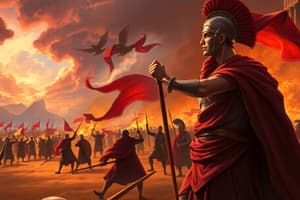Podcast
Questions and Answers
What does Calpurnia urge Caesar to do?
What does Calpurnia urge Caesar to do?
- Go out to the Senate House
- Conquer the Romans
- Stay at home (correct)
- Meet with Mark Antony
What does Caesar believe about the truth?
What does Caesar believe about the truth?
- It is often misunderstood
- It should always be spoken (correct)
- It should be hidden from others
- It is unnecessary in politics
What does Calpurnia's dream symbolize according to her interpretation?
What does Calpurnia's dream symbolize according to her interpretation?
- Caesar will be harmed (correct)
- Caesar will be crowned king
- Caesar will bring prosperity to Rome
- Caesar will face betrayal
What advice does Decius Brutus give to Caesar regarding Calpurnia's dream?
What advice does Decius Brutus give to Caesar regarding Calpurnia's dream?
What is the significant event planned by the Senate for Caesar on this day?
What is the significant event planned by the Senate for Caesar on this day?
What does Caesar imply about the moment if he does not attend the Senate?
What does Caesar imply about the moment if he does not attend the Senate?
Who does Caesar intend to send to inform the Senate of his absence?
Who does Caesar intend to send to inform the Senate of his absence?
How does Caesar feel about Calpurnia's fears by the end of the discussion?
How does Caesar feel about Calpurnia's fears by the end of the discussion?
What does Caesar ask for shortly before leaving?
What does Caesar ask for shortly before leaving?
How does Decius Brutus use Calpurnia's dream to persuade Caesar?
How does Decius Brutus use Calpurnia's dream to persuade Caesar?
What is Calpurnia's main concern about Caesar going out?
What is Calpurnia's main concern about Caesar going out?
Which of the following does Caesar compare himself to when discussing danger?
Which of the following does Caesar compare himself to when discussing danger?
What does the Servant bring back regarding the augurers' predictions?
What does the Servant bring back regarding the augurers' predictions?
What does Calpurnia say happens when beggars die?
What does Calpurnia say happens when beggars die?
What does Caesar imply about death in his conversation?
What does Caesar imply about death in his conversation?
What significant event does Calpurnia describe that adds to her fears?
What significant event does Calpurnia describe that adds to her fears?
What does Caesar dismiss when he states, 'the gods do this in shame of cowardice'?
What does Caesar dismiss when he states, 'the gods do this in shame of cowardice'?
How does Caesar feel about the omens Calpurnia describes?
How does Caesar feel about the omens Calpurnia describes?
What does Calpurnia describe witnessing in her dreams that frightens her?
What does Calpurnia describe witnessing in her dreams that frightens her?
How does Caesar respond to Calpurnia's fears about going out?
How does Caesar respond to Calpurnia's fears about going out?
What does the Servant report about the augurers' findings?
What does the Servant report about the augurers' findings?
What metaphor does Caesar use to compare himself when discussing danger?
What metaphor does Caesar use to compare himself when discussing danger?
What does Calpurnia suggest about the signs from the heavens when beggars die?
What does Calpurnia suggest about the signs from the heavens when beggars die?
What philosophical view about death does Caesar express in his conversation?
What philosophical view about death does Caesar express in his conversation?
What does Caesar say about cowardice and the gods' actions?
What does Caesar say about cowardice and the gods' actions?
According to Calpurnia, what unusual occurrences does she witness that contribute to her fear?
According to Calpurnia, what unusual occurrences does she witness that contribute to her fear?
What does Calpurnia plead with Caesar to do regarding his attendance at the Senate?
What does Calpurnia plead with Caesar to do regarding his attendance at the Senate?
What interpretation does Decius Brutus provide regarding Calpurnia's dream?
What interpretation does Decius Brutus provide regarding Calpurnia's dream?
How does Caesar initially respond to Calpurnia's concerns about the dream?
How does Caesar initially respond to Calpurnia's concerns about the dream?
What reason does Caesar give for not wanting to send a false message to the Senate?
What reason does Caesar give for not wanting to send a false message to the Senate?
What does Caesar say is his reason for not attending the Senate?
What does Caesar say is his reason for not attending the Senate?
What is the Senate planning to do for Caesar on the day of the meeting?
What is the Senate planning to do for Caesar on the day of the meeting?
How does Decius Brutus appeal to Caesar's ambition in his argument?
How does Decius Brutus appeal to Caesar's ambition in his argument?
What does Caesar ask for before he leaves to attend the Senate?
What does Caesar ask for before he leaves to attend the Senate?
What does Calpurnia's dream foretell according to her belief?
What does Calpurnia's dream foretell according to her belief?
How does Brutus react to Caesar's decision to go to the Senate?
How does Brutus react to Caesar's decision to go to the Senate?
Flashcards
Caesar's fear
Caesar's fear
Caesar is worried about a prophecy of his death, as foretold through nightmares, unusual events, and the augurers.
Calpurnia's concerns
Calpurnia's concerns
Calpurnia, Caesar's wife, fears that bad omens and unusual events foretell Caesar's death.
Augurers' predictions
Augurers' predictions
Augurers, soothsayers, advise Caesar not to leave the house today due to unfavorable omens.
Caesar's resolve
Caesar's resolve
Signup and view all the flashcards
Omens and superstitions
Omens and superstitions
Signup and view all the flashcards
Predictive dreams
Predictive dreams
Signup and view all the flashcards
Caesar's attitude
Caesar's attitude
Signup and view all the flashcards
Death of Princes
Death of Princes
Signup and view all the flashcards
Calpurnia's dream
Calpurnia's dream
Signup and view all the flashcards
Decius Brutus' interpretation
Decius Brutus' interpretation
Signup and view all the flashcards
Caesar's decision
Caesar's decision
Signup and view all the flashcards
Senate's plan
Senate's plan
Signup and view all the flashcards
Caesar's reluctance
Caesar's reluctance
Signup and view all the flashcards
Trebonius's deception
Trebonius's deception
Signup and view all the flashcards
Brutus's concern
Brutus's concern
Signup and view all the flashcards
Caesar's confidence
Caesar's confidence
Signup and view all the flashcards
Caesar's arrival
Caesar's arrival
Signup and view all the flashcards
Antony's presence
Antony's presence
Signup and view all the flashcards
What does Calpurnia fear?
What does Calpurnia fear?
Signup and view all the flashcards
Caesar's response to omens
Caesar's response to omens
Signup and view all the flashcards
Why is Calpurnia's dream significant?
Why is Calpurnia's dream significant?
Signup and view all the flashcards
Cowards die many times
Cowards die many times
Signup and view all the flashcards
Why does Caesar go to the Senate?
Why does Caesar go to the Senate?
Signup and view all the flashcards
What is Caesar's attitude?
What is Caesar's attitude?
Signup and view all the flashcards
What does Caesar compare himself to?
What does Caesar compare himself to?
Signup and view all the flashcards
Decius's reinterpretation
Decius's reinterpretation
Signup and view all the flashcards
The Senate's plan
The Senate's plan
Signup and view all the flashcards
Brutus's conflict
Brutus's conflict
Signup and view all the flashcards
Study Notes
Caesar's Decision to Go to the Senate
- Caesar is plagued by unsettling dreams and omens, with Calpurnia predicting bad events through visions of a statue of Caesar that runs with blood.
- The soothsayers warn Caesar not to attend the senate, and the entrails of an offering bear no heart, emphasizing a bad omen.
- Calpurnia pleads with Caesar to stay home, citing the portentous dreams and warnings.
- Caesar initially hesitates but eventually decides to ignore Calpurnia's pleas.
- Caesar prioritizes duty and reputation over personal safety, asserting that cowardice is more dangerous than danger itself.
- Decius Brutus argues against staying home, claiming a positive interpretation of the dreams, persuading Caesar to go to the senate.
- Decius convinces Caesar that a crown awaits him, while also reminding of negative repercussions of staying home.
- Decius highlights the potential negative perception and whisperings that avoiding the senate will invoke.
Omens and Portents
- Nighttime disturbances and unsettling events (e.g., a lioness whelping in the streets, graves opening, warriors fighting on the clouds, ghostly apparitions) foretell doom.
- Calpurnia interprets these events to be dire warnings, urging Caesar to stay home.
- The soothsayers and the entrails of the offering further amplify these warnings.
- Caesar believes the visions and portents are universal and not uniquely directed at him.
Caesar's Character and Motivations
- Caesar displays confidence and a sense of invincibility, disregarding the ominous portents and warnings.
- Caesar is portrayed as stubborn and resolute, unwilling to be deterred by fear or superstition.
- Caesar prioritizes his duty and public image (e.g., telling the senators a lie instead of staying home). Caesar believes he's more powerful than danger itself
- Caesar's strong sense of self-importance and ambition is underscored by his words and actions.
Interactions and Relationships
- Calpurnia is portrayed as a concerned and persuasive figure, ultimately unsuccessful in dissuading Caesar.
- Decius Brutus acts as the opposing voice, expertly persuading Caesar to attend the senate.
- The scene showcases the complex interplay between Caesar's confidence, Calpurnia's concerns, and the powerful influence of other characters.
Preparation for the Senate
- Caesar's entourage, including Brutus, Antony, and others, prepares for his departure to the senate, indicating the anticipation and the looming threat.
- Trebonius, while outwardly expressing loyalty, harbors a deception.
- Caesar plans his speeches, demonstrating a determined spirit.
- The overall scene is brimming with tension and foreshadowing, with characters showing their motivations and actions.
Studying That Suits You
Use AI to generate personalized quizzes and flashcards to suit your learning preferences.



